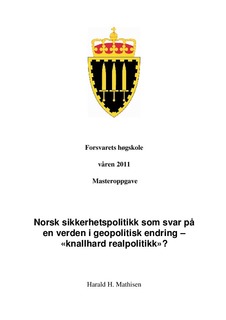Norsk sikkerhetspolitikk som svar på en verden i geopolitisk endring - "knallhard realpolitikk"?
Master thesis
Permanent lenke
http://hdl.handle.net/11250/100030Utgivelsesdato
2011Metadata
Vis full innførselSamlinger
- Masteroppgaver [466]
Sammendrag
Geopolitics is in flux and the last twenty years have marked a change from a bipolar to a unipolar world under US hegemony, some foreseeing a possible change into a multipolar order based on the rise of China and other emerging economies. Norwegian foreign and security policy thinking, as indicated in governmental policy papers, aims at adapting to the new security environment by a number of adjustments. This study examines Norwegian foreign policy thinking and asks if there is concurrence in the policy thinking relative to the realist perspective from international relations theory. By applying five hypotheses deducted from realist theory the policy papers are analyzed and conclusions with regards to concurrence are drawn. To a great extent Norwegian foreign and security thinking and the realist perspective overlaps. However, small states in the international system cannot lever power politics as great powers may, based on their “hard” power utilities. For a small state to counterbalance the lack of military power, support to UN and international law is fundamental, as is the importance of military alliances. Globalization also underscores the growing importance of non-state actors, and the need to re examine they way they affect international relations in order to improve national security. To explain the Norwegian security thinking the realist perspective falls short within three out of five hypotheses. This paper offers ideas on how to expand realism toward a “Small State Realism School of Thought” to improve its explanatory value based on small stats’ political choice in the international system. Additionally, the paper offers proposals on how to utilise political realism to enhance future Norwegian foreign and security thinking and execution
